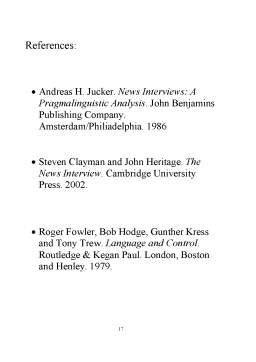Extras din proiect
Semantics answers the question ‘What does X mean’ and is concerned with the inherent meaning of a linguistic unit, for example a phrase or a sentence, without considering its realization in a specific utterance made in a particular linguistic and non-linguistic context. Pragmatics, on the other hand, answers the question ‘What did you mean by X’, it tries to establish the meaning of a linguistic unit in a specific context uttered by a given speaker and addressed to a specific addressee or to specific addressees. Rules are not adequate to describe the meaning of X as used in a particular instance. As opposed to syntax and semantics, pragmatics is not rule-governed but principle-controlled. This assumption has several far-reaching consequences and the most two important are given by G.N. Leech in his “Principles of Pragmatics”, as follows:
1. “The rules of grammar are fundamentally conventional; the principles of general pragmatics are fundamentally non-conventional, motivated in terms of conventional goals.”
2. “In general, grammar is describable in terms of discrete and determinate categories; pragmatics is describable in terms of continuous and undetermined values.”
Leech underlines another important thing about pragmatics and that is “pragmatics endeavours to establish a set of principles which are adhered to in ordinary conversation.” In recent years, there has been an over growing in the study of pragmatics, about the exact nature of the field and how it is to be delimited. In spite of the numerous publications in pragmatics, there is a surprising lacuna of work combining more theoretical approaches, such as for instance Grice’s principles on conversational inference, and empirical investigations of actual language as it is used. Trying to bridge the gap, we may mention two possible approaches. The first one would be to test one or two theoretical concepts against a wide variety of language data. Thus one might study the application of Grice’s principles of conversational inference in everyday conversation between participants of equal or unequal status; in class-room language; in phone in programs on the radio. The other approach would be to select one specific context of language use and try to single out as many of the relevant pragmatic principles as possible.
Continuing our short introduction about differences between semantics and pragmatics, in our paper we will discuss the term of “news interviews”, starting with a short general description of the activity types in news interviews, for example how is it to be distinguished from other kinds of radio programs and how is it to be distinguished from other types of interviews; we will continue presenting the factors that influences the length of the turns of interviewer and interviewee; analyses of the overall structure of news interviews and other themes related to news interviews. Our sources of information are two well known books in this domain of news interviews, “News Interviews” by Andreas H. Jucker and “The News Interviews” by Steven Clayman and John Heritage.
Interviews are not just simply a random example of the role of language in social practice. Their embodiment of inequality of power and their use as an instrument of control make them a typical example. A major function of sociolinguistic mechanisms is to play a part in the control of members of subordinate groups by members of dominant groups. This control is effected both by regulation and by constitutions: by explicit manipulation and by the creation of an apparent ‘natural world’ in which inequitable relations and processes are presented as given and inevitable. Power differential provides the underlying semantic for the systems of ideas encoded in language structure. All language is addressed to someone, and involves an addressee as well as an addresser, it is relational. Communicative relationships are generally asymmetrical, in the sense that one participant has more authority that the other(s); the differences of class or status are at issue in discourse; the relationship is more or less competitive, a negotiation of power. In interviews, the participants are differentiated by their individual purposes, their differences in status, their roles, so that this mode of conversation exhibits an inequality, a skew in the distribution of power. And the language reflects this inequality.
Preview document
Conținut arhivă zip
- Pragmatics - News Interviews.doc
























